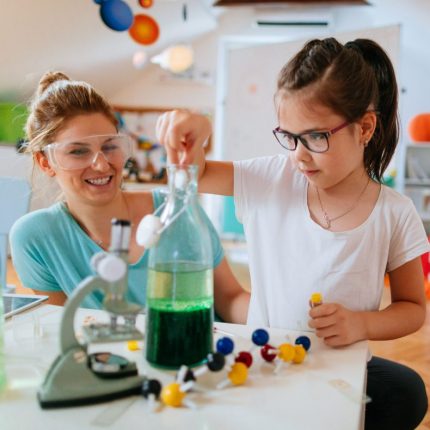Post Sponsored by Home Science Tools
If you’re like many of the parents we support at Home Science Tools, you probably know that science is an important subject for your child to study each year. But you may not know exactly why science is essential or what life skills your child gains from dissecting specimens and competing in science fairs. And you are not alone. Especially if you don’t feel like science is your most knowledgeable subject as a homeschooling parent. In this article, we’re going to help you with all of that as we share four critical life skills your child learns by doing hands-on science and we’ll give you plenty of resources at the end to help you succeed as their teacher.
Are you ready? Let’s dive in!
First things first. Let’s get clear on what we mean by hands-on science.
What is Hands-On Science?
Hands-on science is an approach where children learn by doing science rather than memorizing information. So instead of listening to a lecture and repeating information back to you, when your kids do hands-on science, they are engaged, curious and active in their learning from the start. They get to ask their own questions and find the answer.
Okay, so now that we have a basic understanding of what hands-on science is, let’s dive into the critical skills it offers your child.
Four Critical Life Skills Hands-on Science Teaches Your Child
Life Skill #1: A deeper understanding of concepts
Studies have shown that students who engage in active learning approaches like hands-on science retain a deeper understanding of the concepts presented and often score higher on tests long after doing the science experiments.
Here’s a quick story to explain how it works.
In an experiment at the University of Chicago, two groups of college physics students learned about torque – the resistive force that causes objects to rotate. They used bicycle wheels to feel the resistive force. One group of students held the titled wheels in their hands and got to feel the torque while the other group simply observed. After the experiment, both groups of students took a test and the group that physically held the wheels scored higher on the test than the group that simply watched.
Professor Sian Beilock, director of the study concluded “In many situations, when we allow our bodies to become part of the learning process, we understand better.”
Hands-on learning drives home the connection between the body and the mind for your child – and it’s fun for them too. Win-win!
Life Skill #2: Problem-Solving
As a parent, you already know that learning how to solve problems is important for each child’s development. As your child gains life experiences, they learn independence and how to become a skilled problem solver. They build self-confidence and are more prepared to handle bigger challenges as they grow.
Hands-on science experiments ask your child what they think will happen. They make a hypothesis, do the experiment and then report the results. They get to experience first-hand if the outcome of their experiment was what they expected or not. If a completely unexpected outcome occurred, they can then investigate why they think that was the result and come to a new conclusion, enhancing their overall experience of homeschool science even more.
a hypothesis, do the experiment and then report the results. They get to experience first-hand if the outcome of their experiment was what they expected or not. If a completely unexpected outcome occurred, they can then investigate why they think that was the result and come to a new conclusion, enhancing their overall experience of homeschool science even more.
Life Skill #3: Critical Thinking
Critical thinking is a combination of thinking, reasoning, and making sound decisions. As a homeschooling parent, you play a key role in helping your child develop these skills.
Critical thinking skills are valuable for your child’s higher education and career as well. 93% of US business leaders participating in a survey reported they believe that “a demonstrated capacity to think critically, communicate clearly, and solve complex problems is more important than [a candidate’s] undergraduate major.”
Inquiry-based, hands-on learning is a great approach to help your child develop these skills. It is also likely to be a lot of fun for your child!
Kids love it when we ask them what they think – and hands-on science experiments give your child plenty of opportunities to share what they think will happen and then have fun doing experiments to find out if they were right.
Life Skill #4: Curiosity
Kids are naturally curious – and hands-on science inspires them to be even more curious about their world (just ask any parent how many times their children have asked them “Why? since breakfast). Science is the perfect place to direct all that excitable curiosity.
Curiosity also increases your child’s retention of information. Studies have shown that when we are curious about a subject, we are much more likely to remember the information we learned about that subject. Kids love learning about bugs, anatomy, chemical reactions, robotics, space, and more. With hands-on science, there is no end to nurturing your child’s curious nature.
Hands-on Science Resources for Homeschool Families
Now that you have a few ideas about how valuable doing hands-on science is for your child’s development, here are some of our favorite products and hands-on science education resources for your upcoming school year.
Want the latest and greatest in hands-on science education? Meet Science Unlocked.
- Science Unlocked is our revolutionary new inquiry-based science curriculum. It delivers everything you need to easily provide high-quality immersive science experiences that leverage natural curiosity and hands-on learning to develop the scientist in every child!
- Science Unlocked comes in convenient full-year bundles or individual topical kits that provide the curriculum, supplies, and all necessary guidance to give your student a rich hands-on learning experience.
- Bonus: You don’t need any prior science experience.
- Double Bonus: You don’t even need to like science to rock at teaching it!
Want to browse all the top science curriculums and lab kits for hands-on science?
- Shop our 3000+ science education products.
Want free hands-on science lessons and teaching resources?
- Visit our Resource Center, where 700+ science lessons, projects, parent guides, and teaching resources are waiting for you.
Additional Homeschool Resources
Get Outdoors and Hands-On With Science
Winter Science Activities for Kids
How to Teach Homeschool Science
Latest Posts

While nearly every college and university today is eager to accept homeschooled students into their institutions, homeschooling families need to understand that their student’s application…
Read more >
Guest Post by Gabriel Morse For several years, I sat for long hours every day behind one of those battleship gray desks in a windowless, dull, gray office. The pay was enough to take care…
Read more >
This post is sponsored by Little Monsters Universe. I'm Tina Salmanowitz, an advocate for homeschooling and science education. With over a decade of experience as a science educator (in class…
Read more >


